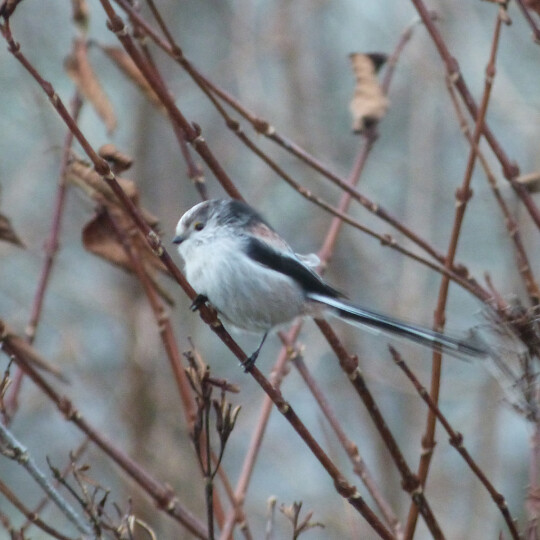The weather is turning colder now, as showcased by one group of garden visitors..
From the middle of summer or when the young birds can fend for themselves, our Long-tailed tits (or 'feathered locusts' as we call them, for their addiction to suet balls!) have dropped in & out of the garden in small groups of 3 to 5 individuals. One group leaves & another appears, as they flit around the feeders. The high 'tik tik' noise is a sign they have arrived.
Closer towards winter the small groups join together. Yesterday's visit brought a group of 9. At the height of winter, we have seen as many as 16 together in a close group.
Small birds lose heat more quickly than larger ones. As the weather gets colder, these tiny birds, who weigh less than a £1 coin, group together to sleep. Choosing a thick shrub such as Hawthorn, they will huddle into a ball with their tails sticking out.
Small birds also struggle to maintain energy stores - as many as 80% of Long-tailed tits can be lost over winter.
Garden feeders are a life-line. You can help by putting out suet-rich foods & small seeds. Breadcrumbs & peanut fragments will also be taken. They have a weakness for crumbled oatcakes we discovered!
Once your garden is known as a good spot to eat, you will be kept entertained by these excitable birds until the spring. Don't be alarmed if you don't see them for a few weeks as the weather warms - they move out into the countryside to breed.
They remain sociable during the nesting season as well. If a pair fails at nesting, they will help relatives with their rearing. This is know as co-operative breeding. The first broods of young birds will also help the parents raise the next group of chicks...
Identification. Often called 'lollipops', these birds can be identified by their black, white & pink colouring. (The youngsters are brown & white & utterly adorable!) Both chicks & adults have a pink rim around their eyes. If you see a small bird that appears to be at least half it's length in tail then you've spotted a Long-tailed Tit.

